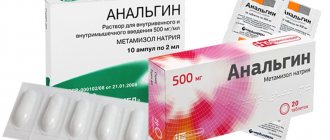In what cases is Analgin needed?
When does a nursing mother need Analgin? Typically, tablets are taken when pain develops - the drug is known for its ability to quickly relieve discomfort. According to the instructions, you can use the product to eliminate the following problems:
- headache;
- migraine;
- myalgia;
- toothache;
- renal and biliary colic (used in combination with antispasmodics);
- neuralgia;
- fever during colds and infectious pathologies;
- pain syndrome in the postoperative period;
- heavy heavy periods.
On a note! In addition to the listed actions, Analgin is used for exacerbation of osteochondrosis, for colic in the abdomen and to alleviate the condition of tumor processes. If the drug is used in combination with other painkillers, a mutual increase in effect is noted.
Negative consequences of taking Analgin
When nursing mothers take Analgin during breastfeeding, metamizole sodium metabolites enter the baby's body with milk.
Most often, due to painkiller treatment, a child develops pathologies of the liver and kidneys.
The medication may have a negative effect on the process of hematopoiesis, which will lead to changes in blood composition.
Negative effects from the respiratory system occur less frequently:
- bronchospasm;
- breathing disorder;
- unconsciousness caused by hypoxia.
Is it possible to drink the product while breastfeeding?
The annotation for the medication states that it is contraindicated for women carrying a baby and lactating. But what do doctors say about this? Is it possible to take Analgin while breastfeeding? Some doctors allow breastfeeding women to take tablets for acute pain when there are no other anesthetics in the house, but with great caution.
The fact is that, penetrating into the body of a newborn with mother's milk, Analgin can cause a violent allergic reaction, up to anaphylactic shock (and this can be fatal for the baby). A baby’s fragile digestive system can cause peeling and itching on the epidermis, red rashes like urticaria, and abnormal bowel movements in a newborn.
Anaphylactic shock is a much more dangerous reaction on the part of the infant’s immune system. In this case, marbling and blueness of the child’s skin, decreased blood pressure, cold sweat, breathing problems, swelling of the larynx and face, and irregular heartbeat are noted. Few mothers know about the possibility of such a reaction of the baby to Analgin, planning to take a seemingly harmless pill.
Why not: danger to the baby
During the neonatal period and infancy, the baby’s organs and systems are rebuilt for independent full breathing, blood circulation, and digestion.
Therefore, the baby’s body is very vulnerable to the effects of negative external factors, primarily toxins and allergens.
Such a damaging agent is metamizole sodium, the active ingredient of analgin.
Penetrating into mother's milk, and subsequently into the baby's digestive tract and bloodstream, it disrupts the natural course of processes in a small organism.
The use of analgin by a nursing mother to relieve pain provokes the occurrence in the baby of:
- symptoms of intoxication;
- disorders of the urinary system;
- hematopoietic dysfunction - inhibition of the formation of thrombocytes and leukocytes;
- digestive problems - manifests itself in frequent regurgitation;
- disturbances in the functioning of the nervous system - expressed in insomnia.
The main threat to the health and life of the baby is allergic reactions, which occur in more than half of the cases.
- More often, in response to the mother taking analgin, the baby develops skin manifestations: red spots, peeling, dryness, rashes.
- In some cases, the child’s body reacts with bronchospasm, manifested by difficulty breathing, hypoxia, and impaired consciousness.
- The most severe response to analgin entering a child’s body is anaphylactic shock, the symptoms of which are: pallor, cyanosis of the skin and mucous membranes;
- rapidly increasing swelling of the face, neck, throat;
- difficulty breathing, cerebral hypoxia;
- arrhythmia and drop in blood pressure.
If even one of the symptoms appears, an ambulance is urgently called, since the condition of anaphylaxis threatens the baby’s life.
Composition and features of the drug
The active substance of Analgin is sodium metamizole, it is present in tablets in the amount of 250 mg or 500 mg. It is used to relieve mild to moderate pain attacks. It is contraindicated to take Analgin during lactation; it causes dangerous side effects on the child’s body.
The peculiarity of the drug is that the tablets may be contraindicated for the nursing mother herself. Analgin should not be used under the following conditions:
- severe disorders of the kidneys and liver;
- presence of bronchial asthma;
- pathologies of the hematopoietic system;
- hereditary hemolytic anemia;
- bronchospasm.
Important! Metamizole sodium causes allergic reactions with hypersensitivity to the component, causing anaphylactic shock in an adult. In many countries, Analgin has long been discontinued due to a large number of side effects, which is why doctors are afraid to prescribe pills to nursing mothers, even with acute attacks of pain.
What are the release forms?
Analgin is sold freely in pharmacies in two forms: tablets and a liquid solution in ampoules for injections. One ampoule contains 500 mg of metamizole sodium, water for injection acts as an excipient.
What effect does the drug have?
The effect of Analgin is based on the process of inhibition of the synthesis of prostaglandins - these are substances formed in human blood plasma and affecting the endocrine system. As a response, the temperature rises, pain and febrile syndrome occur. After taking Analgin, the production of these substances stops, pain shock is stopped, and inflammation is relieved.
What forms are allowed during breastfeeding?
The main component of Analgin, metamizole sodium, is also present in several drugs:
- Revalgin;
- Baralgin;
- Pentalgin.
Since doctors prohibit nursing mothers from using Analgin in injections and tablets, you should refrain from taking the listed medications. They also negatively affect the health of the baby, causing allergic reactions and anaphylactic shock.
Instructions for use
If a nursing mother still needs to take some kind of medication for a severe headache or toothache, and there is nothing at hand other than Analgin, you can use it with the doctor’s permission. It is important to follow the instructions for use so as not to harm yourself and your baby. To keep the concentration of the active substance in milk as low as possible, it is better to take the tablet immediately after putting the baby to the breast. The maximum content of metamizole sodium in the blood is reached an hour after administration, and elimination takes several more hours. It is necessary to maintain this interval between feedings.
A nursing woman is allowed to take no more than 1 gram. of the drug during the day, which is two tablets. After consuming Analgin, it is important to monitor the baby’s condition to see if he or she develops dangerous symptoms in the form of skin rashes, diarrhea, vomiting and abdominal pain.
Attention! If it is necessary to use Analgin during lactation for a long time, then it is better to interrupt breastfeeding for this period. It is recommended to express incoming milk, but under no circumstances give it to the baby. A single dose requires a pause between breastfeeding of 2-3 hours, despite the fact that the medicine penetrates into the milk by only 1.5%.
Indications
It is recommended to take the medication for pain of a severe or slightly intense nature. It has a slight antipyretic effect. The action of the drug is aimed at inhibiting prostaglandins, which are produced in the blood and negatively affect the function of the hypothalamus.
Depending on the nature of the symptoms, it is recommended to take up to two Analgin tablets per day. More than three tablets per day is considered a critical dosage. The instructions for the drug make it clear that Analgin should not be taken while breastfeeding. The drug is prohibited for use in children under three years of age and during pregnancy.
Permitted analogues
There come times in every woman’s life when she experiences fever, headache, toothache, and back discomfort, which requires taking a drug with anesthetic properties. Doctors allow nursing mothers to take several medications that are compatible with breastfeeding and, unlike Analgin, do not cause side effects in the baby. These medications include:
- Paracetamol is a tablet from the group of NSAIDs (non-steroidal anti-inflammatory drugs). The drug helps reduce temperature, eliminate pain and fever, and relieve aches in muscles and joints. Allowed during breastfeeding, but no more than 2-3 tablets per day.
- Ibuprofen is a drug that is available in the form of tablets and suspension. It has similar properties to Paracetamol and does not have a negative effect on the health of mother and child.
The appropriate dosage and frequency of administration in a particular case is determined by the attending doctor, depending on the cause of pain in the woman, the state of health of her and the baby. The drugs Paracetamol and Ibuprofen quickly cope with discomfort and inflammation, are more effective than Analgin and are approved for use during lactation. However, you should not get carried away with them, despite their effectiveness and safety - exceeding the dose and long-term use can also cause negative reactions from the child’s body.
The occurrence of pain, fever and colic in a woman who is breastfeeding is a reason to visit a doctor and find out the reasons for such symptoms. You should not start self-medication, since taking one tablet of such seemingly harmless Analgin can provoke disastrous consequences. Only a specialist can choose a safe and effective medicine that will not harm the baby and relieve the nursing mother from pain.
What is the drug
Analgin tablets are white, round in shape, with a line on one side.
The injection solution is a clear liquid with a yellowish tint.
The medicine belongs to the group of analgesics-antipyretics. This is a non-narcotic pain reliever that is a derivative of pyrazolone. It is available in tablets, injections and rectal suppositories for children.
After administration, Analgin is quickly absorbed from the digestive tract. From 50% to 60% of the drug dose is combined with proteins. The medicine is excreted mainly in urine.
The half-life is 2.7 hours; when the drug is injected into a vein, it is only 14 minutes.
In persons with cirrhosis of the liver, the half-life is extended to 10 hours.
The active ingredient is metamizole sodium.
Analgin is produced by several companies, so the composition of its excipients may differ, which should be taken into account by patients prone to allergies.
Analgin is prescribed to reduce high fever caused by infections, insect bites, and complications caused by blood transfusion.
It is recommended for the relief of pain after surgery, as well as those associated with the following pathologies:
- neuralgia;
- dysmenorrhea;
- joint and muscle pain;
- biliary, intestinal and renal colic;
- headaches of various nature;
- radiculopathy;
- burns;
- injury;
- inflammation of the testicle;
- herpes zoster;
- inflammation of muscle tissue.
During pregnancy, the medicine is contraindicated, since there is not enough data on the use of Analgin in pregnant women.
The drug penetrates the placental barrier, so it cannot be used in the first 3 months of pregnancy, when internal organs are forming.
Analgin should not be taken in the last trimester, as there is a risk of premature closure of the oval window and complications associated with the gluing of platelets of the mother and child.
The drug is contraindicated in pregnant and lactating women
From 4 to 6 months of pregnancy, metamizole sodium should be used with caution.
Analgin is contraindicated in women who are breastfeeding.
Regardless of the form of release, Analgin is contraindicated if a woman has the following pathologies:
- individual intolerance to the composition of the medication and other pyrazolidines;
- congenital deficiency of G6PD, as there is a possibility of hemolysis;
- bronchial asthma and anaphylactic reactions, such as urticaria, runny nose, angioedema, which are caused by treatment with NSAIDs;
- problems with hematopoiesis caused by taking cytostatics or pathologies of the hematopoietic system, in which there is a decrease in the level of neutrophil granulocytes and leukocytes;
- severe dysfunction of the liver and kidneys;
- hepatic porphyria.
The drug should be used with caution if a woman has:
- kidney pathologies, such as pyelonephritis, glomerulonephritis, at the time of treatment or in the past;
- moderate liver and kidney disorders;
- predisposition to a drop in blood pressure;
- pathologies in which hypotension is dangerous, for example, ischemic heart disease, narrowing of cerebral vessels;
- bronchial asthma;
- alcohol addiction;
- intolerance to ethyl alcohol (the risk of allergies increases in such patients).
Injections are not allowed for children under 3 months of age and weighing less than 5 kg.
In case of hypersensitivity to metamizole sodium, it can provoke an allergy, which is manifested by urticaria, angioedema, bronchospasm, Lyell and Stevens-Johnson syndrome, anaphylaxis;
In addition, Analgin can cause the following undesirable reactions:
- impaired renal function, decreased daily diuresis, lack of urination, the appearance of protein in the urine, tubulointerstitial nephropathy, redness of urine caused by rubazonic acid, which is a metabolite of metamizole sodium;
- decreased levels of platelets and leukocytes, which can cause death;
- drop in blood pressure, arrhythmia, allergic acute coronary syndrome.
When Analgin is administered intramuscularly, compactions may occur at the injection site.
If you use the medicine for more than a week in high dosages, then signs of metamizole sodium poisoning may appear:
- nausea;
- vomit;
- epigastric pain;
- decrease in daily diuresis;
- decreased body temperature and blood pressure;
- increased heart rate;
- dyspnea, paralysis of the respiratory muscles;
- tinnitus;
- drowsiness;
- disorder of consciousness;
- decrease in leukocytes;
- delusional ideas;
- impaired liver and kidney function;
- convulsive seizure.
In case of poisoning, the victim's stomach is washed out. To do this, you need to drink a large amount of water, press on the root of the tongue and induce vomiting.
You can take an enterosorbent, for example, Smecta, which is allowed during lactation.
In case of an overdose of Analgin, you need to go to the hospital, where diuretics are prescribed and hemodialysis is performed. If a convulsive syndrome occurs, diazepam and barbiturates are injected into a vein.
Contraindications
According to research, taking analgin is not recommended for:
- individual intolerance to components;
- renal and liver failure;
- inhibition of hematopoiesis;
- bronchial asthma;
- blood diseases;
- tendency to bronchospasms;
- hemolytic anemia associated with deficiency of glucose-6-phosphate dehydrogenase;
- pregnancy and lactation period.
It is important to carefully study the instructions and, if the listed features are present, replace the drug with a safer one.
ATTENTION : The choice of medications should be made on the recommendation of a doctor!
If taking Analgin is unavoidable
If you need to use Analgin during lactation, it is recommended to interrupt breastfeeding and resume it only after 48 hours, after taking or administering the last dose of the painkiller.
In tablets, the drug can be taken 250-500 mg at a time. The frequency of administration is 2 or 3 times a day. You can take no more than 1 g at a time, the highest daily dosage when taken orally is 3 g.
If the medicine is administered intramuscularly or intravenously, the single dosage can vary from 250 mg to 500 mg. Injections can be done 2-3 times a day. The highest single dosage in injections is 1 g, daily dosage is 2 g.
When using Analgin, you need to consider the following:
- when used in combination with NSAIDs and other antipyretic and analgesic drugs, a mutual increase in toxic effect may be observed;
- inducers of microsomal liver enzymes may weaken the effect of the analgesic;
- sedatives and tranquilizers enhance its analgesic effect;
- when used simultaneously with phenothiazine derivatives, severe fever may occur;
- tricyclics, allopurinol, oral contraceptive pills increase its toxicity;
- metamizole sodium displaces indirect anticoagulants, glucocorticoids, indomethacin, and oral hypoglycemic medications from compounds with proteins, resulting in an increase in their activity;
- caffeine enhances its effect;
- metamizole sodium reduces the content of cyclosporine in the body;
- when used simultaneously with pitofenone hydrochloride, which relaxes the smooth muscles of internal organs, and with fenpiverinium bromide, which is an m-anticholinergic blocker, a synergistic effect is observed, as a result of which pain goes away, the temperature drops, and the smooth muscles relax.
Reviews about the drug
Paracetamol, Nurofen and Spazmalgon (drank half). But it’s better not to need analgin, of all painkillers it is the most harmful... It’s generally better to take it at a high temperature as an ambulance and that’s all.
Anastasia Kyiv
https://www.baby.ru/community/view/3335924/forum/post/402903910/
Analgin quinine was given in the maternity hospital after a caesarean section, they said it was ok.
Elena Statsenko
https://deti.mail.ru/forum/zdorove/zdorove_krasota_diety/lekarstva_pri_gv_1448560275/
It’s strange after childbirth, when the stitches hurt - during the examination, the head of the department said in response to my complaints - you can drink 1-2 tablets of analgin, they say it’s okay..... and I drank :(((it seems like the doctor was good and competent.
tatavito
https://eva.ru/static/forums/73/2004_11/225354.html









